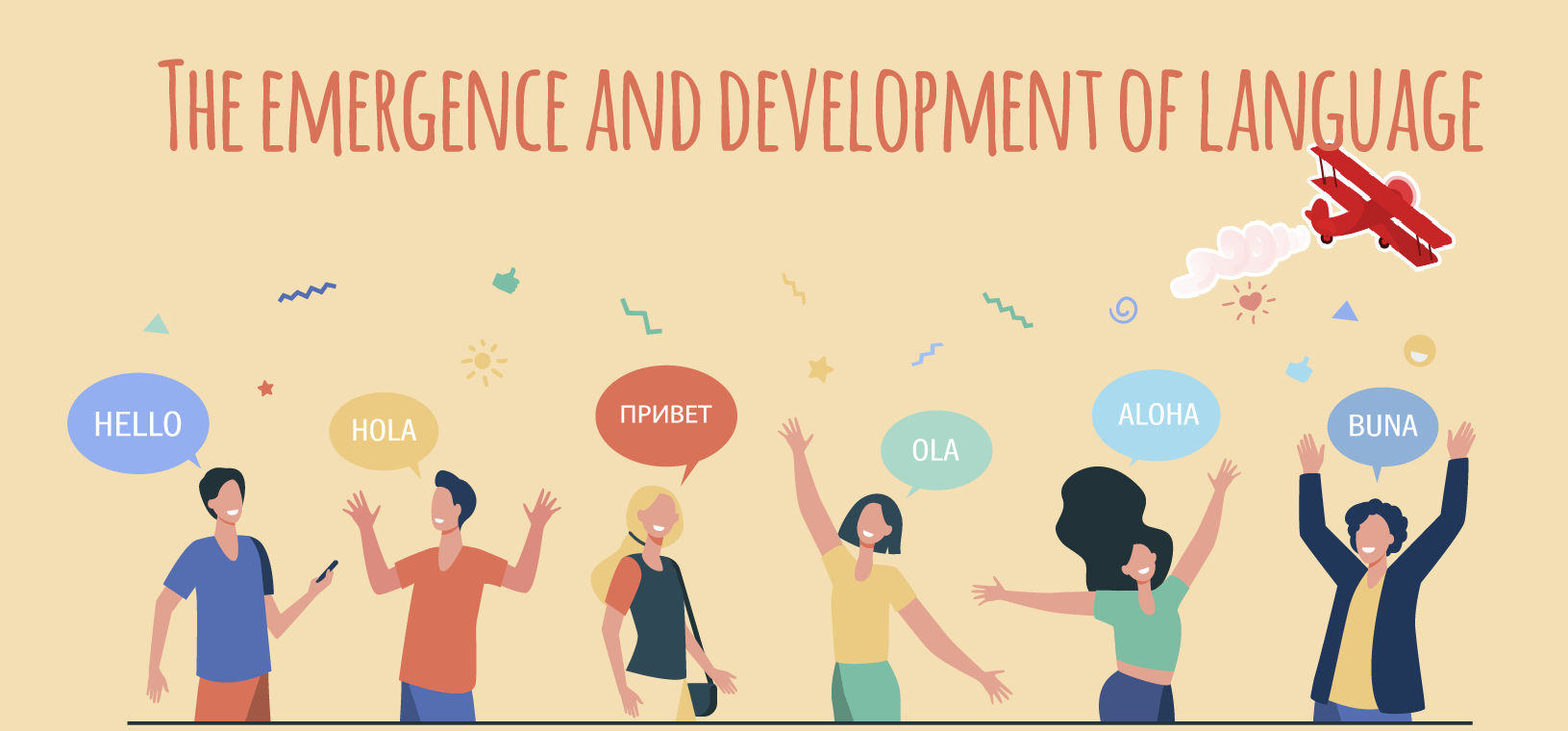The emergence and development of language

The emergence and development of language
INDEX OF CONTENTS
- The first words – faded forever
- On the trail of an original language: experiments, theories and myths
- Language development: more recent scientific theory
- Language as a heritage created by humanity jointly
- Cultural heritage
Language determines our perception, our actions and accompanies us throughout life . With it we can communicate with other people, exchange ideas with them and express our fundamental human need for community and belonging.
Language also inspires our mind, our thinking, and our imagination . It gives us room to externalize our impressions and perceptions through the word, to guide them in channels of thought, to develop ideas, to live dreams, to formulate opinions and to expand knowledge.
The first words – faded forever
But how did the talking human being come about? What were your first words? Traditionally these questions have touched hearts since ancient times. To be fair: we will never know when and where our language originated in the modern sense.
In this direction there are no recordings of a distant past, nor can we go back in time, beyond Caesar, Cleopatra and Socrates, beyond our ancestors from the Stone Age to the era of the so-called animal-human transition field, which is maybe two million years, maybe seven million years ago. We can only know that here, somewhere in this phase of the incarnation, language was born.
With the development of man, language has evolved, it settled wherever man was attracted, expanded and changed, it reinvented itself and adapted it and continues to do so with the course of history. But the first words the man spoke have vanished forever.
On the trail of an original language: experiments, theories and myths
The desire to trace language back to its roots has always led humanity to investigate . The Emperor Frederick II (1194-1250), for example, ordered that newborns should not be treated and only provided the essentials for life. I wanted to know what language they would speak, that would be the original language. Without linguistic attention, but especially emotional, babies literally lacked words, they died early.
The ruler of the Holy Roman Empire was not the only one who carried out such cruel experiments on children, partly for other reasons. For hundreds of years there have been repeated reports of girls and boys growing up isolated from any social contact or in the wild.
The development of language: more recent scientific theories
If in reality human language was inspired by natural tones, it arose from cries of joy or pain or even from a combination of sounds and gestures , today, unfortunately no science can bring that out, because there is no method. In any case, today you don’t want to know anything about an original language. Tracing the prerequisites, reasons, and consequences of speaking ability and language development for human biological and cultural development is what drives the research.
The natural sciences and the humanities work hand in hand : paleoanthropology, anthropology, archeology, neurology, genetics and anatomy, and linguistics are also interested parties in the research at this time.
Biological evolution is known to have laid the foundation for the ability to speak, including the development of the pharynx which is the result of shrinking of the larynx and soft palate, the expansion of a finely tuned vocal tract, the neural control of the speech motor skills and a brain that is capable of regulating and controlling all of this. The cultural evolution of man , on the other hand, propelled his language forward in its development of meaning, expanded and modified it and in turn left traces in the brain or rather: in the consciousness of the human being.
Language as a heritage created by humanity jointly
Language in the present sense has been spoken for up to 125,000 years, at least 40,000 years . However, there must have been some kind of prelude before, as fossil finds and reconstructions of everyday life in the Stone Age attest. Arrangements necessary for defense against enemies or search and positioning within the group, all this may have moved the first representatives of our ancestral gallery to express themselves aloud and to cultivate their vocal expressions as an instrument of social and spiritual organization, even e including a differentiated language, the one tested in the struggle for survival.
When, some 50,000 years ago, only a small group of the species “Homo sapiens” left to leave Africa, they had a complete language with vocabulary and grammar in their luggage. And his memories probably contributed to the fact that the modern type of human being able to assert himself in his new living environment compared to his peers, the Neanderthals, who were already established in Asia and Europe, but linguistically less fluent, and therefore so much was he able to develop his language in a multitude of richly structured languages.
Cultural heritage
Today’s language learner is acquiring a worldwide cultural heritage that has developed throughout the history of mankind and that each generation passes on to the next with its offer of interaction.
It is fascinating to watch and a remarkable achievement of the little ones, how to make (any) language their own. However, unlike our ancestors, they encounter an already existing language system and are already receptive to its sounds in the womb. Language does not have to be invented first, it is already there, but it will also change with us humans in the future.


